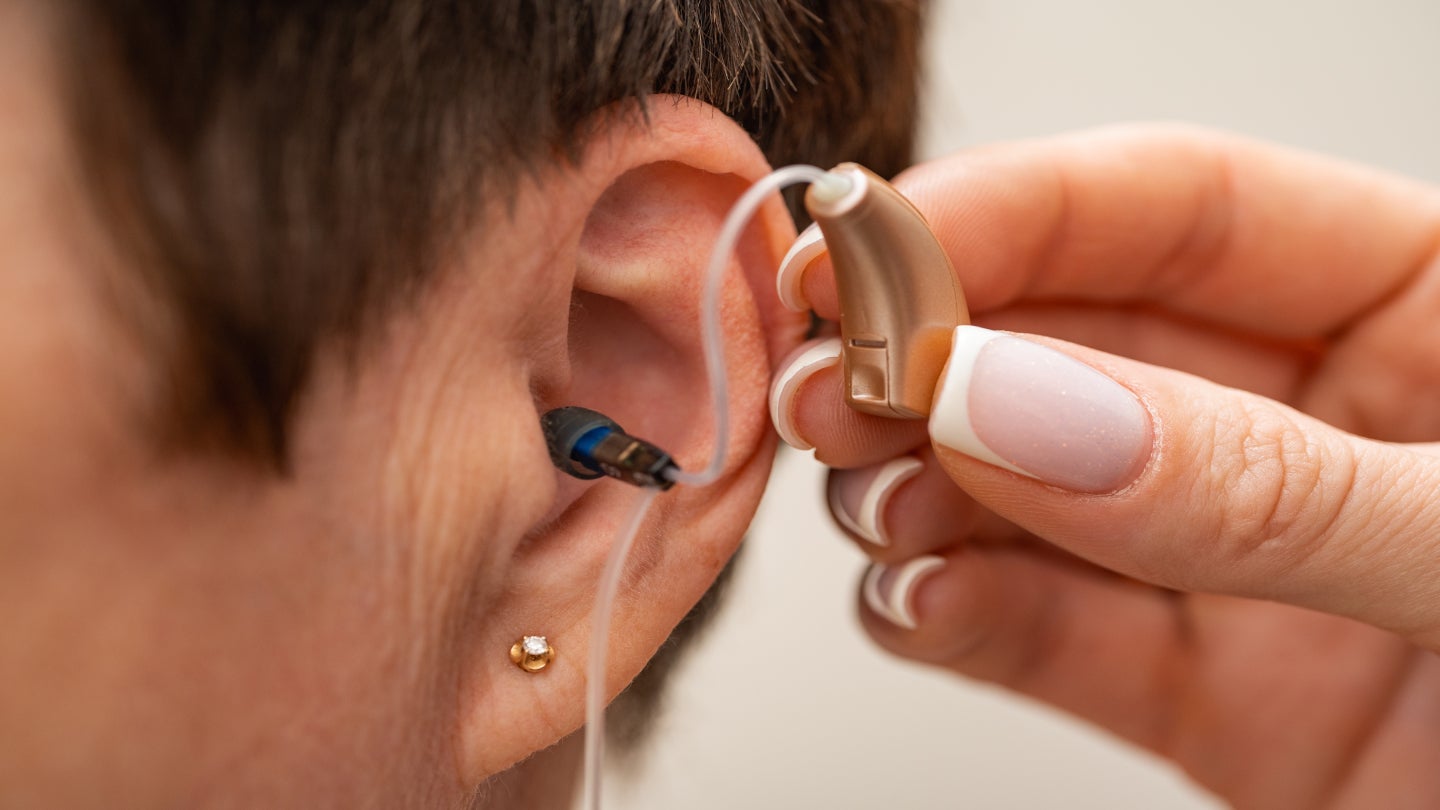
A study designed to assess the impact of hearing aid use on patients at risk of cognitive decline has found that users of the devices are 48% less likely to experience cognitive decline.
The ACHIEVE (Aging and Cognitive Health Evaluation in Elders) study, commissioned by US audiology firm, I Love Hearing, was a randomised study of 977 adults between the ages of 70-84 years at risk of cognitive decline and living with an unrelated hearing condition.
The results found that hearing intervention slowed down loss of thinking and memory abilities by 48% over three years.
As part of the study the full cohort of 977 adults was split into two distinct groups, with one receiving hearing intervention, and the other receiving health education as a control. Both groups were then followed for three years.
The study published in the medical journal, The Lancet, was split into two groups drawing 238 participants from a previous heart health survey, who were more likely to possess the risk factors for cognitive decline. The remaining participants were healthy community volunteers.
Analysing both groups together, the hearing intervention was not better than the health education control on slowing declines in thinking and memory abilities, at the end of the three-year study. However, when both groups of participants were analysed separately, researchers found that the effect of hearing intervention differed significantly between the two groups of participants.
Access the most comprehensive Company Profiles on the market, powered by GlobalData. Save hours of research. Gain competitive edge.

Your download email will arrive shortly
We are confident about the unique quality of our Company Profiles. However, we want you to make the most beneficial decision for your business, so we offer a free sample that you can download by submitting the below form
By GlobalDataThe study results detailed how hearing intervention benefited the heart health study participants the most, with the effects of the intervention reducing cognitive change by 48% over three years.
Audiologist for I Love Hearing, Amy Sapodin, said: “The ACHIEVE study is so significant and so huge in the treatment of hearing loss because, before this time, we just hypothesized that there was a relationship between treating hearing loss and cognitive decline.
“Now, we know for certain that hearing aids can slow cognitive decline in people with hearing loss who are at high risk for dementia.”
The US National Institute of Health (NIH) estimates that among adults aged 70 and older with hearing loss, fewer than 30% have ever used hearing aids. At the same time, the general market for ear-worn medical devices, known as hearables, has risen to become one of the most lucrative areas of the wearable tech space. A report by GlobalData predicts the hearables market to be worth an estimated $146bn by 2030.
Sapodin added: “When one has age-related hearing loss, the brain is constantly receiving a garbled signal, causing it to relocate central resources to deal with that auditory decoding at the expense of thinking and memory abilities.
“We see hearing loss preceding and affecting the brain’s structural integrity. Hearing loss can also affect social engagement and hence affect one’s participation in cognitively stimulating activities.”
Elsewhere in the indication of hearing loss, UK-based audio software company AudioTelligence, has launched a crowd-funding campaign to launch its own hearing aid designed to be able to allow users to follow conversations in noisy environments.
<!-- -->- SEO Powered Content & PR Distribution. Get Amplified Today.
- PlatoData.Network Vertical Generative Ai. Empower Yourself. Access Here.
- PlatoAiStream. Web3 Intelligence. Knowledge Amplified. Access Here.
- PlatoESG. Carbon, CleanTech, Energy, Environment, Solar, Waste Management. Access Here.
- PlatoHealth. Biotech and Clinical Trials Intelligence. Access Here.
- Source: https://www.medicaldevice-network.com/news/achieve-study-finds-hearing-aids-cut-cognitive-decline-by-48/
- :has
- :is
- :not
- $UP
- 11
- 2030
- 7
- 70
- 8
- 9
- a
- abilities
- Able
- About
- Achieve
- activities
- added
- adults
- affect
- affecting
- aged
- Ages
- Aging
- Aid
- aids
- allow
- also
- among
- amy
- an
- and
- ARE
- areas
- article
- AS
- assess
- At
- audio
- banner
- BE
- because
- before
- below
- beneficial
- Better
- between
- both
- Brain
- business
- by
- CAN
- causing
- central
- certain
- change
- cognitive
- Cohort
- community
- company
- competitive
- comprehensive
- condition
- confident
- constantly
- control
- conversations
- credit
- Cut
- daily
- Daily news
- deal
- decision
- Decline
- Declines
- Decoding
- Dementia
- designed
- detailed
- Devices
- distinct
- down
- download
- drawing
- Edge
- Education
- effect
- effects
- end
- engagement
- environments
- estimated
- estimates
- Ether (ETH)
- evaluation
- EVER
- experience
- factors
- fewer
- finds
- Firm
- follow
- followed
- For
- form
- found
- Free
- from
- full
- Gain
- General
- GlobalData
- Group’s
- Have
- Health
- healthy
- hearing
- Heart
- hence
- High
- HOURS
- How
- However
- HTTPS
- huge
- i
- ICON
- Impact
- in
- indication
- industry
- Industry Insights
- insights
- Institute
- integrity
- intervention
- into
- IT
- ITS
- journal
- jpg
- just
- Know
- known
- launch
- leading
- less
- likely
- living
- loss
- love
- make
- Market
- medical
- medical devices
- Memory
- more
- most
- National
- National Institute of Health
- news
- Newsletter
- NIH
- of
- offer
- older
- on
- ONE
- Other
- our
- Our Company
- over
- own
- part
- participants
- participation
- patients
- People
- plato
- Plato Data Intelligence
- PlatoData
- possess
- powered
- preceding
- Predicts
- previous
- Profile
- Profiles
- published
- quality
- receiving
- reducing
- relationship
- remaining
- report
- research
- researchers
- Resources
- Results
- Risen
- Risk
- risk factors
- Said
- same
- Save
- see
- shutterstock
- Signal
- significant
- significantly
- slow
- Slowing
- So
- Social
- Software
- Space
- split
- start
- structural
- Study
- Survey
- SVG
- tech
- than
- that
- The
- then
- There.
- Thinking
- this
- three
- time
- to
- together
- treating
- treatment
- two
- unique
- us
- use
- used
- users
- volunteers
- want
- was
- we
- wearable
- were
- when
- WHO
- will
- with
- worth
- years
- you
- Your
- zephyrnet













